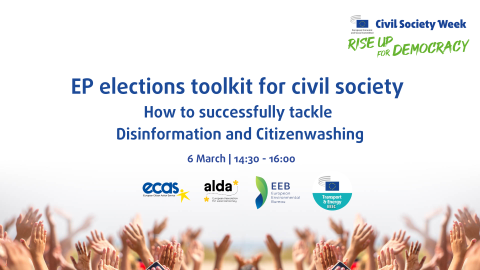European Economic
and Social Committee
EP elections toolkit for civil society: How to successfully tackle Disinformation and Citizenwashing
Webstreaming 06/62 . Back to Agenda
Draft Agenda
14:30 – 14:40 Welcome and Introduction by Desislava Ivanova, Programmer Director for CEE, ECAS
14:40 – 15:55 Tackling disinformation and citizenwashing: what can CSOs do?
- Séamus Boland - President of the EESC Civil Society Organisations' Group
- Renate Schroeder – Director of European Journalists' Federation
- Ruby Silk - Communications Officer - Environmental Law and Justice, EEB
- John Comer - EESC member TEN Section, Rapporteur for the EESC opinion ‘Safeguarding Democracy Against Disinformation’
- Moderators: Desislava Ivanova, ECAS and Margarida Martins, EEB
15:55 - 16:00 Final Remarks by Desislava Ivanova, ECAS and Margarida Martins, EEB
Concept Note
In the run-up to the European Parliament elections in June 2024, disinformation, fake narratives and other forms of attack on democracy are likely to continue in greater numbers and to become more sophisticated. It is therefore crucial that EU citizens, civil society organisations, and EU policy makers work side by side on pan-European solutions to counter disinformation and build resilience. In the last two years, ECAS has been supporting civil society organisations across the EU through capacity-building to empower them to effectively counter fake narratives and drive democratic participation. In 2024, ECAS will make available three ‘First Aid Democracy Toolboxes’, which will be specifically aimed at three target groups: EU citizens, CSOs and EU policy makers.
The Civil Society Week workshop will focus specifically on the Toolkit for CSOs with the aim to present participants with practical tips to battle disinformation and fake news and encourage the formation of civil society coalitions for joint action ahead of the EP elections.
In addition to the toolbox, ALDA and EEB will present the concept and case-studies on citizenwashing (false/misleading claims of democratic decision-making) as a form of disinformation and a threat to democracy. The aim is to formulate recommendations to ensure public participation processes do not fall into the trap of misrepresentation, based on the good practices and lessons learned. This would tie into EEB’s work on environmental rights, ALDA’s work on democracy, and EESC’s drafting of the opinion on “Strengthening civil dialogue and participatory democracy in the EU”.
